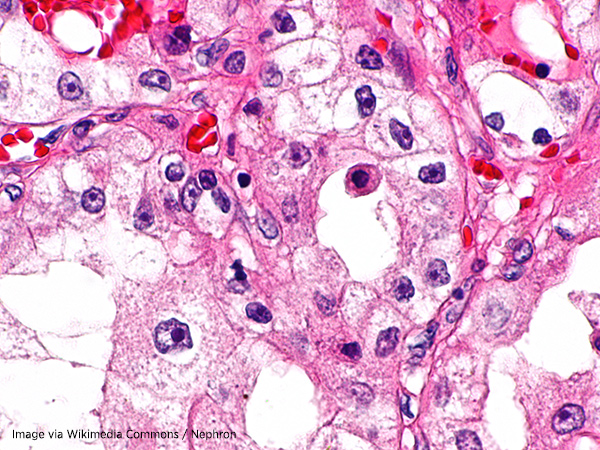Combining Therapeutics to Treat Kidney Cancer
The FDA approved the combination of an immune checkpoint inhibitor and a therapeutic that prevents tumors from growing blood vessels to treat certain patients with renal cell carcinoma.

The U.S. Food and Drug Administration (FDA) has approved the combination of nivolumab (Opdivo) and cabozantinib (Cabometyx) as a first-line treatment for patients with advanced renal cell carcinoma, which is the most common form of kidney cancer.
Nivolumab is an immune checkpoint inhibitor, a type of immunotherapy that works by releasing the PD-1/PD-L1 brakes on cancer-fighting immune cells. It was first approved to treat certain patients with kidney cancer in 2015. Cabozantinib is an antiangiogenic therapeutic, a type of anticancer agent that prevents tumors from establishing the blood and lymphatic vessel networks they need to grow and survive. It was approved to treat certain patients with kidney cancer in 2016.
The efficacy of this combination as a new first-line therapy was evaluated in a randomized, open-label trial in patients with previously untreated advanced renal cell carcinoma. Patients were randomly assigned to a group that received nivolumab in combination with cabozantinib or to another group that received sunitinib, another antiangiogenic therapeutic.
The median progression-free survival among the patients treated with nivolumab plus cabozantinib was 16.6 months versus 8.3 months for those treated with sunitinib. The overall response rate was 55.7 percent for those in the nivolumab plus cabozantinib group compared to 27.1 percent for patients who received sunitinib.
Kidney cancer is among the 10 most commonly diagnosed cancers in the United States. The National Cancer Institute estimates that there are over 73,000 new cases of kidney and renal pelvis cancer diagnosed in the U.S. each year. Several antiangiogenic therapeutics are used as standard treatments for advanced renal cell carcinoma. However, resistance to these agents frequently arises within a year and the cancer progresses, further demonstrating the need to develop new ways to treat the disease.
The FDA approval was rendered on January 22. 2021.
